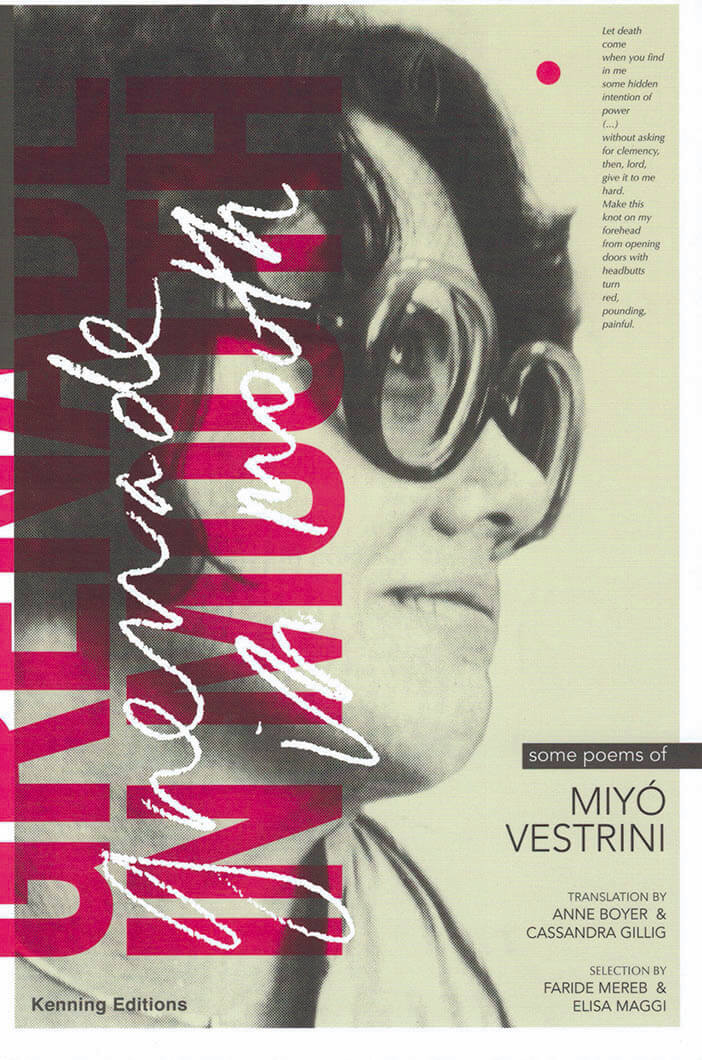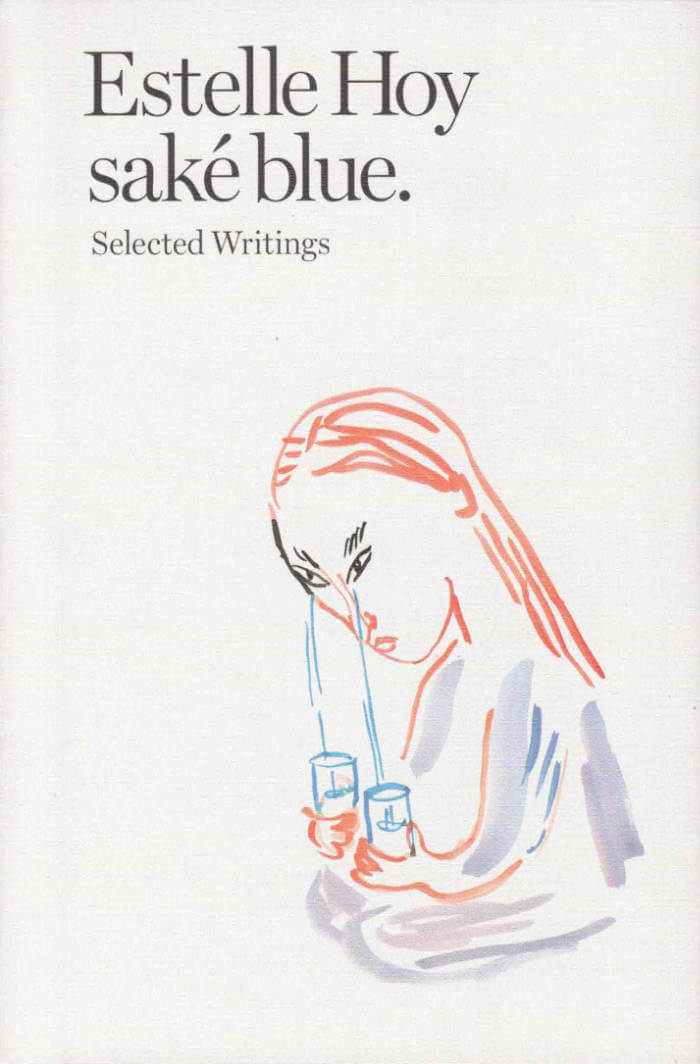
Grenade in mouth
Language: English

Language: English

Can critical thinking spring from both a fortune cookie and Jacques Lacan’s most obscure seminar footnote? Estelle Hoy says yes. In saké blue, overpriced cheesecakes are the starting point for an essay on art writing; shoplifting in Berlin opens to a reflection on the economies of activist practices; fiction allows us to discuss the legacy of institutional critique, queer mélanges, or quiet melancholy. To her, the story of art becomes more nuanced in light of lyrics by Arthur Russell, the posthumous sorrow of Sylvia Plath, or a poem by Yvonne Rainer.
saké blue gathers critical essays, art reviews, and poetic fiction. Written in dialogue with the work of Martine Syms, Marlene Dumas, Hervé Guibert, or Camille Henrot, these texts combine the subjective and analytic, addressing power relations and the force of affect. Hoy spares nothing—and no one, exposing cultural clichés and urgent political issues through fast-paced acerbity. She advocates the work of women artists, mocks stereotypes, questions myths, and champions desire, sadness, and boredom. Simultaneously beautiful, lyrical, and cutthroat, her writing echoes to the reader like l’esprit d’escalier—we think of the perfect reply just a little too late.
“Estelle Hoy practises philosophy as an unsettled but deeply committed query into existing together. She reads, she looks, she writes, to find out something essential about the future and living for it.”
—Lisa Robertson, author of The Baudelaire Fractal
“Estelle Hoy's prose slap and bite, saké blue is a sharp pleasure to read.”
—Calla Henkel, author of Scrap
“Hoy’s renditions of all-too familiar scenes are made more visceral than life with sparkling prose and a sly attention to life’s many shifting values that feels more than appropriate for anyone truly interested in art.”
—Natasha Stagg, author of Artless
Edited by Antonia Carrara
With an introduction by Lisa Robertson

A HANDBOOK OF DISAPPOINTED FATE highlights a decade of Anne Boyer's interrogative writing on poetry, death, love, lambs, and other impossible questions.
"The essays in this book model the poet’s no: they refuse to make things easy when they aren’t, preserving the messy difficulty of cancer, of poverty, of staying alive under capitalism." - Julia Bosson

Sticky Fingers' Fortune Teller features wisdom from McKenzie Wark, Octavia E. Butler, Kate Zambreno, bell hooks, Clarice Lispector, Eileen Myles, Kathy Acker, Johanna Hedva, Lou Sullivan, Audre Lorde, June Jordan, and Anne Boyer.
A3, single colour risograph

'My aim for Mother Reader has been to bring together examples of the best writing on motherhood of the last sixty years, writing that tells firsthand of the mother's experience.
Many of the writings in Mother Reader comment on and interpolate one another, in citations, in footnotes, in direct homage. As I was assembling this collection one text would lead to one another, treasure-hunt fashion, the clue provided by an acknowledgement or bibliography. And just as often the writing circles back.
In Mother Reader chapters are excerpted from autobiographies, memoirs, and novels; entries are lifted from diaries; essays and stories are culled from collections, anthologies, and periodicals. My project has been to assemble a compendium or sampler of these ''kindred spirit'' works on motherhood, so that readers, and especially mothers with limited time on their hands, can access in one volume the best literature on the subject and know where turn to continue reading." [Moyra Davey in the introduction]
Writings by Margaret Atwood, Susan Bee, Rosellen Brown, Myrel Chernick, Lydia Davis, Buchi Emeta, Annie Ernaux, Mary Gaitskill, Susan Griffin, Nancy Hutson, Mary Kelly, Jane Lazarre, Ursula K. Le Guin, Doris Lessing, Ellen McMahon, Margaret Mead, Vivian Montgomery, Toni Morrison, Tillie Olsen, Alicia Ostrker, Grace Paley, Sylvia Plath, Adrienne Rich, Sara Ruddick, Lynda Schor, Mira Schor, Dena Schottenkirk, Mona Simpson, Elizabeth Smart, Joan Snyder, Elke Solomon, Susan Rubin Suleiman, Alice Walker, Joy Williams, Martha Wilson, Barbara Zucker.

The theme was built around the idiom “VOSTOK”, the title given by Stéphanie Pécourt to her cycle dedicated to performative semantics, in which carte-blanches signed by guest curators at the Centre Wallonie-Bruxelles are deployed. Buried beneath several kilometers of ice, Lake Vostok acts as an invitation that both fascinates and refuses us. This sub-glacial lake on the edge of Antarctica, the largest identified, becomes the mirror-object of our desires and fears for the abyssal depths. The title of the program, Now I am a Lake, is taken from Sylvia Plath's poem Mirror (1961).
This booklet includes the scripts and texts of the performances, translated exclusively into French for the occasion, as well as images from the videos presented at the eponymous event. The compilation focuses on Sylvia Plath's poem Mirror, and includes an introductory text by curator Pauline Hatzigeorgiou.
edited by SB34
graphic design by Raphaëlle Serres / Solid Éditons
Contributions by Signe Frederiksen, Pauline Hatzigeorgiou, Margaux Schwarz, Hagar Tenenbaum, Sylvia Plath & Eleanor Ivory Weber

The second poetry collection from artist, curator and writer Hana Pera Aoake. The book begins with a placenta placed into a Pohutukawa tree and spirals out across manifold interrogations and anecdotes of the poet’s life. the poetry harnesses a vibrant decolonial commentary on the life/death cycle:
“Bodies that span the past, present and future
It’s non linear, omnipresent, human and non human”
The poetry maps ways in which the lived and living memories of colonial histories are held, endured and warped inside one’s body, which is to say the whole Earth. “Pain and age are knotted together” she states. In many ways the book attempts to illustrate a delicate symbiosis of all living and non-living things, yet localises the pain and joy which manifests from these systems within her own life. The poetry asks how ideology changes the way we love, parent and make art.
Hana Pera Aoake expands these cyclical frameworks of flux and impermanence across her otherwise diaristic and witty verse. Hana Pera Aoake writes on sculpture, anger, labor, detention, greed, genocide, the ocean, the family, sovereignty, sanity and love. The writing spares no opportunity for irony and opinion, housing articulations of political dreaming within a resilient and potent humour. The book is generous in its exploration of Māori belief systems and indigenous solidarity as much as it is on rhythmic, free-associative verse. An exciting and expansive collection of poems.

An inscription of time at the coast, singing crows, albatrosses and seagulls. STOP. Extracted from the earth a whole alphabet. The waves uplifted countries and washed mountains until the storm came undone. The plantation of tobacco was maintained among the meadows and cafes flourished as the core of erudition, the power was theirs - you could see it in cinema- the actors spoke feverishly with enthusiasm, rather than breathless, meticulous and austere. The scars healed on mysterious skin that came out of the shadow to cross the day.

Mourn Baby Mourn explore la question du deuil et de la lamentation, tant intime que collective, à travers les états qu’ils génèrent. En trois actes pulsatoires, l’autrice pose les mots, massifs comme des parpaings ou les expulse, offensifs et spontanés tels des projectiles. Ce monologue parcourt les désordres émotionnels caractéristiques des temps contemporains, marqués par la nostalgie de futurs perdus. Dans ce texte-vortex hanté par les imaginaires et les visions discordantes d’un devenir collectif, l’écriture de soi est une existence agissante, et une résistance.
Le texte est issu de la pièce chorégraphique éponyme de Katerina Andreou créée en 2022.
Conception graphique : Angeline Ostinelli
Édité avec le soutien de BARK, du CCN-Caen en Normandie dans le cadre du dispositif artiste associé et de Charleroi Danse.